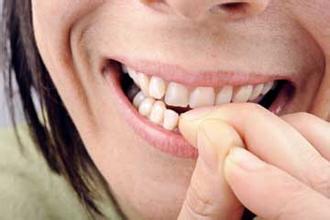(单词翻译:单击)
If you don't smoke or do drugs you may think you're clear of bad habits. But what if you bite your nails or pop gum repeatedly? Bad habits aren't addictions. They're repetitive, negative behaviors that often start as coping mechanisms -- ways to reduce stress, relax and generally feel better. They aren't generally dangerous, just annoying to those around you.
也许你会认为,自己不抽烟不吸毒,就与不良习惯丝毫不沾边。但如果你没事就爱啃自己的指甲或者嚼口香糖吹泡泡呢?不良习惯并不是指对事物着迷上瘾, 而是一系列重复而负面的行为。它们起初是作为一种减轻压力、放松身心和提高个人舒适度的方式而存在。一般情况下,这些不良习惯并不会危害你的健康,只是会让你周围的人觉得很反感而已。
So, how do you stop doing them? It's not so easy. Habits can trigger the release of dopamine, a chemical that's part of the brain's reward system. You get positive reinforcement from your brain for performing these habits, so that compels you to keep going. In addition, researchers have found that habits form familiar neural pathways in your brain. If a behavior is routine, this frees your brain to concentrate on other things. That's great if you've gotten into the practice of meditating each evening, but it can be bad news if you're downing a pint of ice cream in front of the TV instead. We've got a list of 10 really hard habits to break and ways you might overcome them. And speaking of ice cream, let's kick off our look with one that plagues most of us.
那么,究竟如何才能改掉这些不良习惯呢?这真的很困难。这些习惯可以触发人体释放一种名叫多巴胺的化学物质,它是大脑“回报机制”的组成部分。在做这些习惯性动作时,你体验到快感增强,这又反过来促使你继续保持这一习惯。此外,研究人员发现习惯可以在大脑内构建熟悉的神经通道。当行为成为习惯之时,大脑就可以被解放出来去专注于其他事务了。如果你已经形成了每晚都要冥想的习惯,那太棒了;反之,如果你每晚在看电视时能不知不觉吞下一品脱(约0.58升)的冰淇淋,那可就太糟了。本文列举了10个最难改变的恶习以及可能克服它们的方法。既然已经谈到了冰淇淋,那么我们就先来看看这个使绝大多数人都深受困扰的不良习惯。
10.Snacking
10.吃零食

I mentioned eating ice cream at night because snacking is not only one of my bad habits; it's my hardest one to break. If I chose to snack on nutritious foods like fruits and vegetables, it'd be one thing. But chips and ice cream call my name. So why do we snack, and why do we reach for the high-fat, high-sugar, high-calorie foods?
在上文中我已经提到了晚上吃冰淇淋这一例子,这是因为吃零食不仅是我的众多不良习惯之一,更是最难改变的一个。如果我进食的是诸如水果和蔬菜这类有营养的食物,那便罢了;但问题是,薯条和冰淇淋总是在向我招手。那么,究竟我们为什么会吃零食?又为什么非要选择那些高脂,高糖,高热量的食物呢?
One simple reason: Our brains tell us to because they make us feel good. Foods high in fat and carbohydrates raise our mood by producing neurotransmitters like serotonin and anandamide. Back in prehistoric times, when eating was all about survival, it made sense for your brain to reward you for seeking out high-caloric foods. These brain chemicals work with others like opioids that can relieve stress and even physical pain. But these are temporary effects; the negatives, like feeling sluggish and guilty or even gaining weight, aren't worth it. For those times when you're legitimately hungry between meals, the solution is to make sure you have satisfying foods on hand that will fill you up, like small amounts of nuts. If you find yourself mindlessly snacking in front of the TV, make a rule only to eat when you're focused on your food. Look for other ways to make yourself feel better -- hanging out with a friend, going for a walk or watching your favorite show on TV. If only carbs will do, keep the serving as small as you can.
其实原因很简单:大脑指挥我们如此,因为吃零食的感觉实在是太棒了!富含脂肪和碳水化合物的食物可以产生诸如五羟色胺和大麻素等神经递质,从而使我们的情绪高涨。回望史前时期,在饮食与生存息息相关的情况下,大脑自然会激励你寻找高热量的食物。这些脑神经化学物质与类鸦片活性肽等其他物质共同作用,可以起到缓解压力,甚至减轻生理性疼痛的作用。然而这些好处都只是一时的;若是因为吃零食使人萎靡不振,内疚不已,甚至引发体重增加等负面效果,那就得不偿失了。当然,在两餐之间会产生饥饿感是人之常情,解决方法就是保证你手边有可以使你产生饱腹感的食物,比如少量的坚果。如果你发现自己有时百无聊赖地坐在电视机前,不假思索地吃着零食,你该考虑养成一个习惯:只有注意力放在食物上时,才吃东西。此外,你还可以寻找其他替代方法来使自己更加惬意——比如与朋友共度美好时光,出去散散步,或者看你最喜欢的电视节目。但如果只有碳水化合物才可以解你心忧,那么请尽可能地控制摄入量吧!
9.Nail Biting
9.啃指甲

Biting your nails isn't as unhealthy a habit as snacking, but it's still a bad one. It's embarrassing to have ragged, chewed nails. And since it's a habit associated with anxiety, it can feel like people learn all about your mental state just by glancing at your hands.
啃指甲并非像吃零食一样不健康,但这仍然是个坏习惯。被啃过的指甲周边参差不齐,看起来很不得体,试想如果在某个重要场合被人看到这样的指甲,将会多么难为情啊!而且由于啃指甲一般是焦虑所致,似乎人们只要扫一眼你的双手便能了解你的精神状态。
Interestingly, the fifth edition of the American Psychiatric Association's Diagnostic and Statistical Manual of Mental Disorders classifies nail biting as a body-focused repetitive behavior disorder, along with hair twirling and skin picking and relates them all to behaviors characteristic of obsessive-compulsive disorder (OCD). One big difference is that most people with OCD want to stop their practices because they don't get any pleasure from obsessively lining up their shoes or washing their hands. Nail biters, on the other hand, usually find gnawing on their tips pleasurable and stress-relieving. While nail biting is not generally harmful, if you attack the cuticles you can risk bleeding and bacterial infection. One way to stop the habit is to keep your nails impeccably manicured, so you won't want to ruin them. Some people put bitter-tasting polish or even a bandage on a finger to remind themselves to stop the biting and find something else to do.
有趣的是,美国精神病学会出版的第五版《精神疾病诊断与统计手册》将啃指甲、抓头发和抠皮肤归为一种聚焦于躯体的重复性行为障碍症,并且认为这些症状都与强迫症的典型行为相互关联。二者最大的一个区别是,大部分强迫症患者都希望自己不再受那些习惯的困扰,因为他们无法从把鞋子排列得过度整齐或者过度清洁双手的过程中得到一丝一毫的快感。而恰恰相反,咬甲癖患者却常常很享受这个在指尖上啃咬的过程,这能让他们舒缓压力,心情愉悦。虽然啃咬指甲通常不会使人受伤,但如果你咬伤了指甲周围的皮肤,仍然会导致出血并可能造成细菌感染。戒掉这一恶习的一种方法就是定期精心修剪指甲,保持其整洁美观的状态,这样你就舍不得毁掉它们了。有些人会涂上苦涩的指甲油,甚至在手指头上绑上绷带,以此提醒自己停止啃指甲,并找些其他事情来忙活。
8.Procrastinating
8.拖延症
I've put off this article because I work best under pressure! OK, not really. Although we often joke about procrastinating, it can be a really bad habit. Procrastinators sabotage themselves to avoid doing something that they don't want to do. They're the ones who cram all night for a test, routinely pay late fees for bills and buy gifts on the way to the party. The outcome is often poor test marks, wasted money and a late arrival at the event. It's not about running out of time; it's about failing to regulate behavior. It's difficult to understand the motivation behind procrastination but here are some common reasons.
“我之所以延期完成这篇文章,是因为在高压下我能做得更好”——拖延症患者常常这样安慰自己,但事实并非如此。虽然我们经常拿拖延症来调笑,但它确实是一个坏习惯。拖延症患者总会找出一些借口来避免做自己不想做的事情。他们往往会临阵磨枪,到了最后关头才为了应付考试通宵达旦;常常会因为拖延而缴付滞纳金罚单,抑或是在参加聚会的路上才开始准备礼物。这样做的结果往往就是考试成绩不如人意,浪费金钱,参加聚会迟到。造成这种局面的原因往往不是时间不够,而是拖延症患者无法规制自己的行为。人们很难弄懂拖延症背后的动机因素,但这里列举一些常见的原因:
Fear of failure or success; Fear of making a bad decision; Seeking a pressure-fueled adrenaline rush; Rebelling against controlling parents or other authority figures. No matter what the reason, if procrastinating is a problem in your life, you have to be proactive. Set clear goals, with rewards if necessary, and imagine how great you'll feel when you finally complete that project with time to spare. You might even consider enlisting somebody to keep you honest and check in with you on your progress. And you have to do it right now.
对成败得失的恐惧;害怕做出错误的决定;寻求高压下肾上腺素激增的快感;反抗父母或者其他权威人士的控制;无论出于什么原因,如果你有拖延症,那就必须同时具有前瞻性。设定清晰的目标,有必要的话,也可以在自己达成目标后给予一定奖励,试想一下自己提前达成既定目标的满足感,那时你一定会如沐春风吧!你甚至可以考虑召唤小伙伴来监督你如实完成任务,同时记录你的进展情况。那么,还犹豫什么!此时此刻就开始行动吧!
7.Swearing
7.爆粗口

When a character starts swearing on TV or in a movie, it can be pretty funny. But it's often not so funny in real life. Many people consider swearing vulgar, low class and unprofessional. They see the swearer as lacking in self-control and unable to express himself properly.
电视或者电影中的人物爆粗口是一件看似很有趣的事情,但这要是发生在现实生活中,就绝不是那么有趣了。很多人觉得讲脏话是一件低俗、没品且不道德的事情,他们认为那些随意爆粗的人缺乏基本的自控能力,不会用合适的方式来表达自己。
On the positive side, swearing has been shown to calm a person down and let her express anger without hurting anybody. A British researcher found that swearing helped his subjects to bear pain better than those who said a neutral word. Swearing turned on the subjects' fight-or-flight responses, allowing surges in adrenaline. However, the researcher cautioned that swearing loses its emotional potency the more it's done, lessening its ability to dull pain. That's probably true of swearing in general – it has less potency the more you do it. One way to stop is through using a "swear jar." Put in a set amount of money every time you swear when you shouldn't, and make it enough to hurt. Decide what you're going to do with the money, and make it something that's not fun, like putting it into your retirement account or paying off a debt. (Otherwise you've just given yourself a good reason to keep on swearing). You could also try substituting innocent words. Everyone will be laughing for real when you yell "Suffering Succotash!" next time something goes wrong at work.
从积极的层面来看,一个人爆粗时表明他想要冷静下来,他想在不伤害任何人的情况下通过咒骂来释放自己的怒气。一位英国的研究人员发现,爆粗的人比不爆粗的人能承受更多的痛苦,这是因为人在说脏话时会触发开启“还击——逃跑”反应机制,使得肾上腺素的分泌激增。但同时,研究人员也告诫人们:说脏话的次数越多,其调节情绪的功能就越差,减轻痛苦的功效也就会越弱。一般来说这多半是正确的——你咒骂的次数越多就越无济于事。停止说脏话的方式之一就是使用“爆粗处罚罐”,在你每次不该爆粗而爆粗时,就放入一笔数额不少、足够让你肉疼的钱。你还要考虑一下怎样使用这些钱,最好用它们来做一些无趣的事情,比如存入你的退休金账户或者用来偿还债务(否则你只是为自己可以继续爆粗找了一个绝好的理由)。你也可以尝试用委婉无害的语言替换掉爆粗时常说的一些话,当你下次在工作中遇到麻烦而大喊“苦难的豆煮玉米”时,同事都会被你逗乐的。
6.Gum Snapping
6.嚼口香糖
Learning how to blow bubbles is one of those childhood rites of passage, like whistling or riding a bike. But by the time we reach adulthood, we're not normally chewing bubble gum, but the kind that freshens breath. That gum isn't ideal for blowing bubbles, so some people resort to snapping, or popping it instead. Much like nail biting or hair twisting, gum snapping can become an unconscious behavior used to relieve stress or boredom. However, there are some positives of gum chewing. Researchers found that it made people focus better on tests of mental agility for about 20 minutes. Maybe that's why some people do it at work. The problem is, the endless popping sound can be so distracting for the people around you that they may be tearing their hair out or even complaining to their human resources manager.
像吹口哨、骑自行车一样,学吹泡泡是童年时代必做的事。但长大之后,我们却不嚼泡泡糖,转而喜欢可以清新口气的口香糖。如果想要吹泡泡,口香糖并不十分理想,因此有些人就使劲嚼,让它们发出“嘣嘣”的声音。就像啃指甲、拧头发一样,嚼口香糖也会成为人们在释放压力或者打发无聊时光时的一种无意识行为。然而,嚼口香糖也并非一无是处。研究人员发现,这种行为在思维敏捷度测试中有助于人们提高注意力达20分钟以上。也许这就是为什么有些人在工作时喜欢嚼口香糖的原因吧。但问题在于,嚼口香糖带来的噪音很容易使你周围的人分心,会让他们抓狂甚至向人力资源经理投诉你。
If you're a gum-snapper, think about why you're doing it and find a quieter way to deal with that emotion. If you're worried about bad breath, stock up on mints or keep a toothbrush at work.
如果你喜欢嚼口香糖,也许应该认真思考一下自己为什么会这样,然后最好找一个安静点儿的方式来处理你的情绪。如果你很担心自己口臭,那就在办公室放一把牙刷或放点儿薄荷糖吧。
审校:落月 编辑:旭旭 来源:前十网


